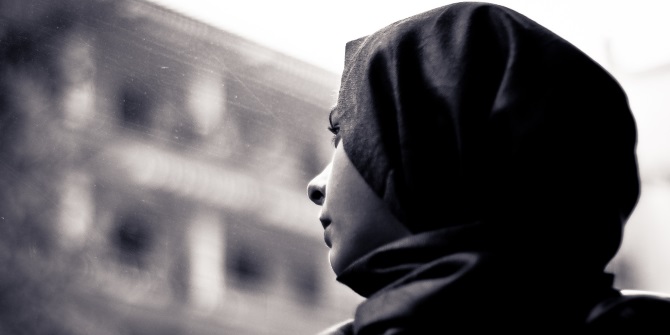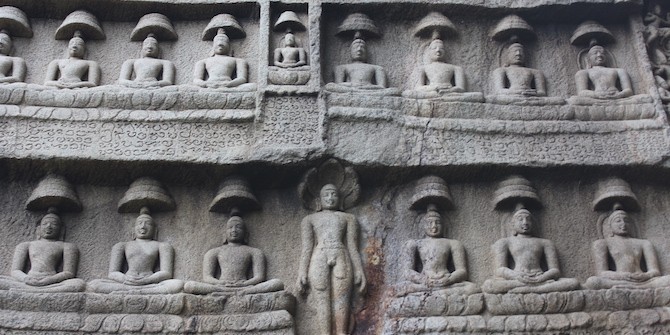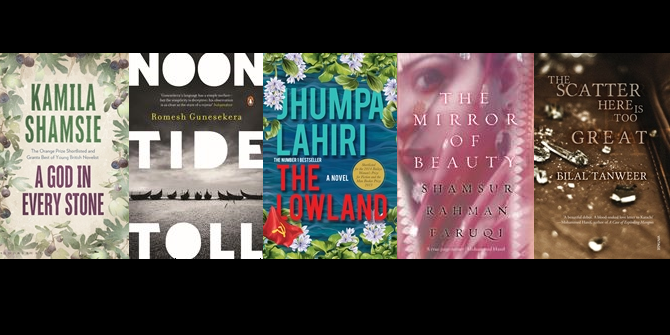 Prison Narratives is a translation of a diary by Akhtar Baloch, an 18-year-old female Sindhi activist. Asad Abbasi finds the core of the book, which documents the period in 1970 when Baloch was imprisoned for leading a protest, to be insightful, imaginative and full of interesting characters, yet finds the contextualising additions to be deeply partisan. Nevertheless, he writes that the diary is an important and rare text for anyone interested in gender debates in Pakistan.
Prison Narratives is a translation of a diary by Akhtar Baloch, an 18-year-old female Sindhi activist. Asad Abbasi finds the core of the book, which documents the period in 1970 when Baloch was imprisoned for leading a protest, to be insightful, imaginative and full of interesting characters, yet finds the contextualising additions to be deeply partisan. Nevertheless, he writes that the diary is an important and rare text for anyone interested in gender debates in Pakistan.
Prison Narratives. Akhtar Baloch. Compiled and Translated by Asad Palijo. OUP Pakistan. 2017
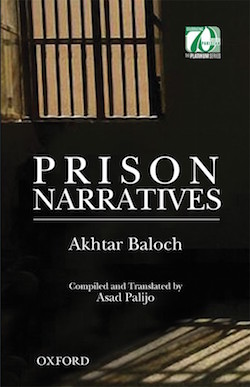 Published originally in Sindhi in 1972 and now translated in English for the first time, Prison Narratives is a descriptive account of women serving jail time in the southern Pakistani province of Sindh during late 60s and early 70s. Written by Akhtar Baloch while in prison for political activism during the Yahya Khan regime, the book reveres Sindh, poetry, women and the Bhutto family.
Published originally in Sindhi in 1972 and now translated in English for the first time, Prison Narratives is a descriptive account of women serving jail time in the southern Pakistani province of Sindh during late 60s and early 70s. Written by Akhtar Baloch while in prison for political activism during the Yahya Khan regime, the book reveres Sindh, poetry, women and the Bhutto family.
The backdrop for the protest and the hunger strike are described in the three introductory sections. The first section, by Rasool Bux Palijo – Akhtar Baloch’s step-father and a prominent political writer – gives a summary of the political context of late 60s. In the second section, Rasool Bux Palijo writes his version of Baloch’s arrest. In the third section, Baloch writes about her arrest and her first night in prison. With elections impending next year, this edition of the book, and particularly these sections and the epilogue, are perhaps a reminder of author’s dedication towards Pakistan People’s Party. Thankfully, the ‘core’ of Prison Narrative, i.e. the diary itself, surpasses party promotion.
In Pakistan, discrimination along the lines of language, ethnicity and religion began immediately after independence. Sindhis, like Bengalis, faced economic discrimination as early as the 1949 budget, which prompted cuts and revisions of all the 88 infrastructural programs in Sindh (Ansari, 2016, p.825). Furthermore, Sindhis were ‘inadequately represented in the non-elected institutions of the state.’ (Bose and Jalal, 2004, p.196). 1n 1947, According to Stephen Cohen, Pakistan Army only had 2.2 per cent Sindhi speakers (Cohen, 1984, pg 44), even though this demographic made up more than 6 per cent of the population. By 1959 there was still not a single Sindhi among the 47 senior positions in the Army.
The civil administration was no different. In 1959, of 3,532 civil officers, 48.9 per cent were Punjabi speakers, and 30.3 per cent were Urdu speakers, while Sindhi speakers accounted for just 2.5 per cent (Jaffrelot, 2014, p.129). After the independence of Bangladesh in 1971, the number of the Sindhis increased proportionally within the country, but not within the civil administration. By 1974, Sindhis made up 11.7 per cent population, but the ‘representation in the senior ranks of the civil service’ for Sindhis ‘was a mere 3.6 per cent’ (Cohen, 2004, p.213).
After a decade of Ayub Khan’s rule, elections were announced in July 1969. Despite the Sindhi student movement playing a crucial role against the military regime, the state announced that electoral registration would be published in Urdu but not in Sindhi. Sindhi-speakers saw this as another discriminating attack. Akhtar Baloch, just 18 at the time, was one of the many who protested and observed a hunger strike, for which she was incarcerated for the first time in her life.
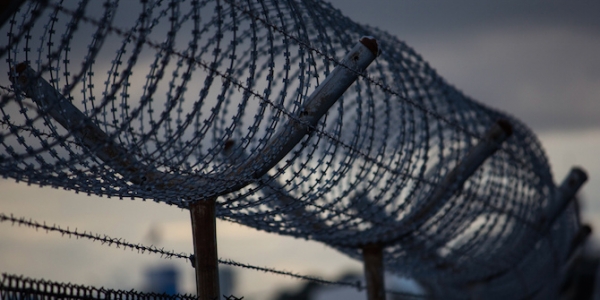
But it was only when she was arrested the third time for ‘leading student protest’ (p.32), on 25 July 1970, that this diary was born. Once again behind bars, Baloch kept a daily record the life of women prisoners (including herself), their routines, their conflicts, and their conditions in the Hyderabad and the Sukkur jails of Sindh.
Baloch describes the other prisoners not as prisoners, outcasts, rejects, but as people full of life, yearning for acceptance. Bakhtawar remains ‘hopeful’; Kaz Bano sings; Mehlaan cares for her son; Ratni, a Hindu prisoner, faces religious and cultural intimidation; Fatima is grateful to her captives— like the prisoner in Anton Chekhov’s short story The Bet— for the opportunity to read, write and eat meat on state expenses. Taaj is funny: when asked by a visiting student as to her crime, Taaj replies,‘ Like you, I too had come to visit, but the authorities refused to let me leave and imprisoned me here’. But above all, these prisoners are humans who are desparate to be remembered: “Don’t ever forget us, please don’t forget us”, they plea (p.159). Baloch rarely judges, always endeavouring to understand her fellow inmates.
For Baloch, crime is a consequence of socio-political situation in Sindh. The reason for their crimes, Baloch writes, ‘lies in our feudal system’ (p.76) and tries to understand ‘how a woman is to become victim to male chicanery in a patriarchal society’ (p.161). When told ‘so many Sindhi women commit murder’, Baloch replies ‘this may be because they have no other option’ (p. 141). These prisoners are not criminals but victims of institutional failure, prisoners of patriarchy. She hopes: ‘the time will come for the downtrodden masses to hold exploiters and wicked elements accountable for draining the blood of the poor’ (pg 47).
Baloch incrusts core of Prison Narratives with Sindhi literature: Letters, stories, literary references, and, above all, poetry. The words of Shah Abdul Latif Bhitai, the 18th century thinker and poet, and Shaikh Ayaz, the revolutionary, contemporary poet, add mystical, lyrical voice to Baloch’s inner and political struggles. Shah Jo Risalo, Latif’s poetry compendium, is the only book in Baloch’s possession in prison (p.73). If the explicit adulation goes to Benazir, the politician, the implicit homage goes to Bhitai, the poet.
Unfortunately with all the literary references— poetry, songs, stories— translation fails the original book. The original prose in Sindhi, I assume, would be animated, zesty, crisp. The translation achieves none of this as it aims to target simplicity, but not piquancy, which creates a literary gorge between poetry and prose.
Some diary entries also suffer from repetition. ‘Edit it’, was my original plea, but on reflection, I think this repetition replicates the humdrum routine in prison. ‘The prison life’, Baloch writes, ‘is extremely monotonous’ (p.108). Within this monotonous routine exists fluid prison economy, which Baloch transcribes in detail. Not the cigarette barter one is used to, from the movies, but the more mundane exchange of rotis, milk and shampoo.
On 18 December 1970, Akhtar Baloch was released from the prison along with other political prisoners. Baloch’s diary is anti-state and also anti-patriarchal. It criticises the state for discriminatory attitude towards Sindhis and it is anti feudal as it reprimands landlords for suppressing the women of Sindh. Baloch fumes at the military rule for its obstruction of democracy. But at the same time, Baloch, in her epilogue, absolves Pakistan People’s Party, her party, of any failure to improve the conditions of ‘downtrodden masses’.
The harshest criticism, however, Baloch reserves for herself. Singing praise for women of Palestine, China and Vietnam, who ‘valiantly face volley of ’ bullets for the sake of their homelands’, Baloch censures women ‘like us’ who are ‘carefree, indulging in snacks like samosas and pastries, eager to adopt new fashion trends and watch movies and do little else…..We have beautiful girls, but their youth and beauty is useless. They will while away their lives applying lipstick, wearing rich clothes and watching films’ (p.47). And then Baloch sighs, at the age of eighteen, in prison for political protest, on the 8th day of her hunger strike: ‘I have wasted a lot of time’.
This article gives the views of the author, and not the position of the South Asia @ LSE blog, nor of the London School of Economics. Please read our comments policy before posting.
About the Author
 Asad Abbasi has a Masters degree in Political Economy of Late Development from LSE. Currently, he is researching conceptual frameworks of development.
Asad Abbasi has a Masters degree in Political Economy of Late Development from LSE. Currently, he is researching conceptual frameworks of development.



